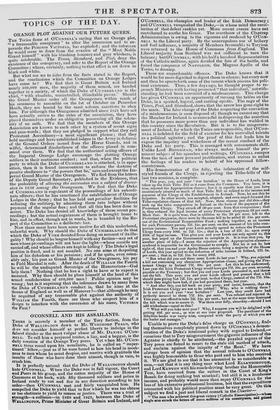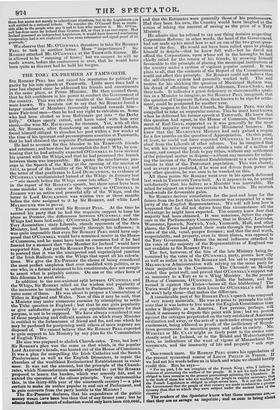O'CONNELL AND HIS ASSAILANTS.
THERE is scarcely a member of the Tory faction, from the Duke of WELLINGTON down to Mr. WINTHORP PRAED, who does not consider himself at perfect liberty to indulge in the•falsest slander or the most vulgar abuse of Mr. DANIEL O'CON- NELL. To call him a perjured traitor, a liar, and a beggar, is the daily vocation of the Orange Tory press. Yet when Mr. ()Ven- tura. turns round upon his assailants, he is called an " imper- tinent" fellow,—just as if he were forced to bow his head in meek- ness to men whom he must despise, and receive with gratitude the insults of those who have done their utmoit, though in vain, to crush him.
It is perfectly natural that the Duke of WELLINGTON should hate O'CONNELL. When the Duke was in full vigour, the Court and Peers in his grasp, and the rotten majority of the House of Commons at his back, with fifty thousand soldiers and police in Ireland ready to cut and fire in any direction according to his order—then O'Cosnsma. met and fairly vanquished him. He compelled the Duke to yield that to fear which he was too obtuse or too obstinate to yield to reason or justice. There was a trial of strength—a collision—in 1828 and 1829, between the Duke of WELLINGTON, Prime Minister of Great Britain and Ireland, and ()Ventura., the champion and leader of the Irish Democracy ; and.0 Connera. vanquished the Duke,—in whose mind the recol- lection of that defeat rankles yet. More recent events have not contributed to soothe his Grace. The overthrow of the Claptrap Administration is owing to the vigorous aid rendered by OVen- NELL to the Liberal party. By the unscrupulous use of bribery and foul influence, a majority of Members favourable to Toryism were returned to the House of Commons from Englund. The Liberal majority from Scotland was not sufficient to turn the balance ; but O'Connera., with his half a hundred Representatives of the Catholic millions, again decided the fate of the battle, and forced the conqueror of NAPOLEON, the Magnus Apollo of the Tories, to decamp. These are unpardonable offences. The Duke knows that it would be far more dignified to digest them in silence; but every now and then he spurts forth some of the venom which poisons his poli- tical existence. Thus, a few days ago, he thought proper to re- proach Ministers with having promoted " that individual," notwith- standing he had been convicted of a misdemeanour. This charge has given O'CONNELL an opportunity of turning the tables on the Duke, in a spirited, logical, and cutting epistle. The rage of the Times, Post, and Standard, show s that the arrow has gone right to the mark. The false charge of the Duke respecting the conviction of a misdemeanour, is soon disposed of; though we cannot say that the Member for Ireland is so successful in disproving the assertion that he possesses more power than any individual has wielded in this country since the Revolution. But it is to the misgovern- ment of Ireland, for which the Tories are responsible, that O'Cos- NELL is indebted for the field of exercise for his unrivalled talents as a political agitator ; and the proof of this fact leads him to expose the impolicy and wickedness of the recent conduct of the Duke and his party. This is managed with consummate skill. Unlike Lord BROUGHAM, who always makes himself the pro- minent subject of his speeches and writings, OtoNseta. escapes from the task of mere personal justification, and strives to enlist the feelings of his readers in behalf of his oppressed fellow- countrymen.
His demonstration of the folly, the infatuation of the self- styled friends of the Clergy, in rejecting the Tithe-bills of the last two sessions, is complete. " This year, you, and your war battalion' in the House of Lords, have taken up the Irish Tithe Bill as it came from the Commons. You have, it is true, rejected the Appropriation clauses ; but it is equally ti ue that you have unanimously adopted so much of that Tithe Bill as related to the income and payment of the Clergy of the Establishment in Ireland. Now, let not this be forgotten. In other words, you accepted, adopted, and even urged forward the Tithe-regulation clauses of that bill. Now, these clauses just did this—they took up the tithe composition in Ireland as the basis of the payment of the Protestant Clergy. They struck off 30 per cent, from that composition ; that is, they reduced the legal income of every Protestant clergyman 30 per cent. Mark that. It is quite true, that in addition to the 70 per cent, left to the Protestant clergyman, there were by thesame bill to be added 2L 15s. per cent. out of the Ecclesiastical Temporalities Fund ; making together, as an income for each Protestant parson, 72/. 15.s. per cent, on the amount of his tithe corn- postion income. You and your Lords actually agreed to reduce the Protestant Clergy from every 100/. to 72/. I5s. ; that is, a loss of 27/. 5s. upon every 100/. of legal income. This plan you and your Lords not only agreed to, thus! year, but urged on the Government to complete it. It is true that you, by another piece of folly—I mean the rejection of the Appropriation-clauses- rendered it impossible for the Government to comply. But let it not be lost sight of, that you and your Apsley House coterie, being a majority of the House of Lords, this year agreed to the reduction of tithe income in Ireland, 271. Si. per cent. ; that is, to 72/. 15s. for every 100/. "But what did you and these same Lords do last year ? Why, you rejected a bill not containing any obnoxious Appropriation-clause, and giving the Pro- testant Clergy in Ireland 771. 10s. per cent. Let this be but understood. Last year the Irish Protestant Clergy would have got 771. 10s. per cent, secured, payable at the Treasury; but that you and your Lords prevented it, and threw out the bill. This year, you and your Lords offered and pressed that a bill should pass giving but 721. 15s. per cent, to that Clergy, instead of the 771. 108. which they might have had, if you had permitted them, last year. " And after this, you fall back on your piety, and insist, forsootn, that the Irish Protestant Clergy are not to be robbed ! Why, who is robbing them ? Is is not you and your war battalion ? ' Last year, they could have had perfectly secured to them 771. 10s. per emit. You refused and rejected rt. This year, you offered to take 721. 15s. per cent., but at the same time destroyed the bill which was to secure it. Was there ever folly, absurdity—should I not add wickedness—equal to this? "What will you take next year? Why, I suppose you will be delighted with getting 60/. per cent., as was at one time proposed. The purchaser of the Sibylline books was vastly wise, compared with the party of which you are the leader and manager." Unable to prove the Duke's false charge on ()Comeau., finde ing themselves completely pinned down by O'CoNsamc's demon- stration of the Duke's irrational policy with regard to Ireland,- conscious that to Tory misgovernment the gigantic influence of the Agitator is chiefly to be attributed,—the puzzled organs of the Tory press are forced to resort to the stale old method of attack, and exclaim against the iniquity of "the Rent." .We have always been of opinion that the annual tribute to 0 Cosrsrsts. was highly honourable to those who paid and to him who received it. We are glad to see that it has amounted to so considerable a sum,—not that it is any thing near what Lord ELLENBOROUGH, and Lord KENYON with hi3 coach-driving brother the Honourable Tom, have received from the suitors in the Court of King s Bench for doing nothing but mischief; but still it is, a handsome income, and probably would more than repay O'Coscssu. for the loss of his extensive professional business, but that the expenditure. connected with his political position must be very great. On this subject we find a just and liberal remark in the Courier- " The man who achieved this great victory (Catholic Ernancipation)—whose single arm struck the fetters off seven millions of hui countrymen, and gained them free access not merely to subordinate situations, but to the Legislature—is well entitled to a national tribute. We consider the O'Connell Rent as credit- able alike to the people who pay it and to him who receives it. Mr. O'Con- nell has done more for Ireland than Grattan did, or than it can ever repay. Had Ireland possessed an independent Legislature, it would have deserved everlasting vituperation had it not conferred on him seine substantial and signal proof of its gratitude."
We observe that Mr. O'CONNELL threatens to take Sir ROBERT PEEL to task in another letter. More " impertinence!" Sir ROBERT attacked Mr. O'CONNELL at the Tamworth dinner. He is allowed to be "cunning of fence;" but we suspect he will be made aware, before the controversy is over, that he would have been quite as discreet had he held his tongue.



























 Previous page
Previous page